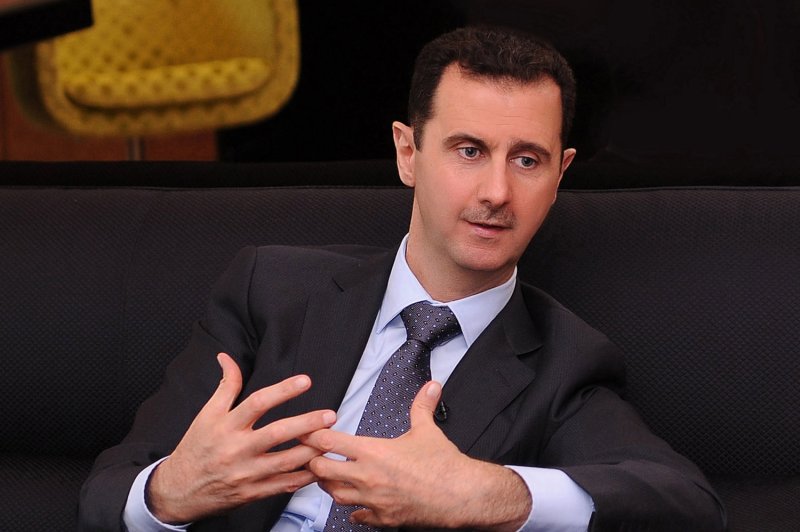A handout photo distributed by Syrian News Agency (SANA) on July 3, 2012, shows Syria's President Bashar al-Assad during an interview with a Turkish newspaper in Damascus. UPI |
License Photo
BEIRUT, Lebanon, Nov. 6 (UPI) -- The recent killing of an Iranian Revolutionary Guards general in Syria's civil war underlines what analysts say is Tehran's growing military presence in supporting its embattled ally, President Bashar Assad, with some saying the Iranians now control the regime's military campaign.
Brig. Gen. Mohammad Jamali-Paqaleh, a veteran of Iran's 1980-88 war with Iraq, is at least the senior Guards Corps officer to be slain in Syria this year.
Iran's semi-official Mehr news agency disclosed the death Monday, but gave no details of how, where or even when he was killed.
But it said he had volunteered to "defend the Syrian people against terrorists" and to protect the Sayyida Zeinab shrine in the southern suburbs of Damascus, revered by Shiite Muslims as the tomb of the Prophet Muhammad's grand-daughter.
There's been heavy fighting recently in that part of the Syrian capital. The shrine's defended against rebel forces by Hezbollah, Iran's Lebanese ally, and Iraqi Shiite fighters recruited from Iranian-trained "Special Groups" who fought the Americans in Iraq.
Mehr gave few details about Jamali-Paqaleh and Iran's state media appeared to be at pains to stress that Jamali-Paqaleh had not been ordered to Syria to fight rebels seeking to topple the Damascus regime of President Bashar Assad. He and Hezbollah are Iran's key Arab allies.
But it was disclosed that Jamali-Paqaleh had trained at the same Guards Corps facility as Maj. Gen. Qassem Suleimani, one of Iran's most able generals and commander of the Guards' elite Al-Quds Force.
That's the corps' covert arm which spearheads the Iranian forces in Syria. Suleimani, who was also a decorated hero of the 1980-88 war, is skilled in counter-insurgency warfare.
Western and Arab intelligence services say he took command of Assad's military operations against the disparate rebel forces, at Tehran's behest, earlier this year and swiftly reversed the regime's fortunes on the battlefield.
Since the Quds Force is pretty much running the military campaign now, that suggests that Jamali-Paqaleh too belongs to that outfit. Suleimani prefers having old comrades and commanders of proven combat capabilities around him.
Another top-ranking Quds Force officer, Brig. Gen. Hassan Shateri, like Suleimani a veteran of covert operations in Afghanistan and Iraq, was killed Feb. 13. His presence in Syria pointed a far greater Iranian involvement than had been thought.
Shateri was apparently assassinated as he drove from the battlefront in Aleppo, a city in northern Syria and a key war zone, and Beirut, where he'd operated covertly with Hezbollah since 2006.
He was a close friend of the silver-haired Suleimani, who wept at his funeral. It was not clear whether Suleimani attended Jamali-Paqaleh's funeral in the southeastern Iranian city of Kerman Tuesday.
Jamali-Paqaleh was killed amid preparations by the regime for a major offensive against rebel-held territory between the southern outskirts of Damascus, a major combat zone, and the Qalamoun Mountains to the west along the rugged border with Lebanon.
Tehran wants to take control of that sector which straddles strategic road networks to reopen links between the minority Alawite regime in Damascus to the Alawite heartland in the northwest, and with the Mediterranean ports of Latakia and Tartus.
The much-anticipated offensive is likely to be a prolonged operation that will, in large part because of the mountainous terrain, involve counter-insurgency warfare more than big battalions of tanks and mechanized troops.
This is the kind of combat in which Suleimani, 56, and the Quds Force excel, along with several thousand Hezbollah fighters and hardened Shiite veterans from Iraq as well as other Shiites reportedly recruited from Lebanon, Yemen and the Persian Gulf States.
Western and Arab intelligence sources say Suleimani, who the Americans deem to be Iran's most formidable military commander and strategic thinker, assumed command of operations in Syria earlier this year after repeated regime failures.
One of his major successes was Hezbollah's capture of the strategic town of Qusair in western Syria near the Lebanese border June 5, which re-opened vital supply lines from Lebanon. Similar operations are underway elsewhere.
It's unlikely Iran has any sizeable force in Syria that are actually engaging in combat. For now, the emphasis is on directing Assad's war because his demoralized generals seem incapable of finding a winning strategy, and to ensure that Iran maintains a strategic gateway to the Levant in Syria.





